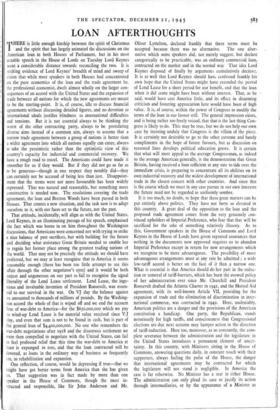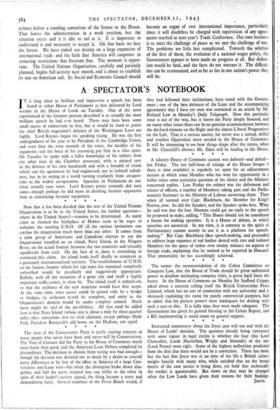LOAN AFTERTHOUGHTS WHERE is little enough kinship between the spirit
of Christmas I and the spirit that has largely animated the discussions on the American loan in both Houses of Parliament, but in his most notable speech in the House of Lords on Tuesday Lord Keynes went a considerable distance towards reconciling the two. It is striking evidence of Lord Keynes' breadth of mind and sweep of vision that while most speakers in both Houses had concentrated on the pure economics of the loan and the trade agreement he, the professional economist, dwelt almost wholly on the larger con- sequences of an accord with the United States and the expansion of trade between all nations for which the new agreements are meant to be the starting-point. It is, of course, idle to discuss financial agreements without discussing detailed figures, and no devotion to international ideals justifies blindness to international difficulties and tensions. But it is not essential always to be thinking the worst of the other contracting party, always to be postulating diverse aims instead of a common aim, always to assume that a narrow trade agreement between a group of nations is better than a wider agreement into which all nations equally can enter, always to take the pessimistic rather than the optimistic view of this country's capacity for industrial and commercial recovery. We have a rough road to travel. The Americans could have made it smoother for us if they would. But if they did not go so far as to be generous—though in one respect they notably did—they can certainly not be accused of being less than just. Disappoint- ment that the terms were not more favourable has been widely expressed. That was natural and reasonable, but something more constructive is needed now. The resolutions covering the trade agreement, the loan and Bretton Woods have been passed in both Houses. That creates a new situation, and the task now is to adapt ourselves to it, with our faces set to the future, not the past.
That attitude, incidentally, will align us with the United States. Lord Keynes, in an illuminating passage of his speech, emphasised the fact which was borne in on him throughout the Washington discussions, that Americans were concerned not with trying to strike a nice balance of past sacrifices, but with building for the future and deciding what assistance Great Britain needed to enable her to regain her former place among the greatest trading nations of the world. That may not be precisely the attitude we should have preferred, but we may at least recognise that to America it seems reasonable enough (there has been too little attempt to see this affair through the other negotiator's eyes) and it would be both unjust and ungenerous on our part to fail to recognise the signal liberality of the Lend Lease settlement. Lend Lease, the inge- nious and invaluable invention of President Roosevelt, was essen- tial to our survival in the war. On VJ day the balance against us amounted to thousands of millions of pounds. By the Washing- ton accord the whole of that is wiped off and we end the account free of war-debt to America—for the $65o,000,000 which we pay to wind-up Lend Lease is for material value received since V.J day, and even that sum is not to be found in cash, but is part of the general loan of $4,400,000,000. No one who remembers the war-debt negotiations after 1918 and the disastrous settlement we were then compelled to negotiate with the United States, can fail to feel profound relief that this time the war-debt to America at least is expunged in toto, and that the loan contracted will be devoted, as loans in the ordinary way of business so frequently re, to rehabilitation and expansion.
One reflection, of course, would be depressing if true—that we might have got better terms from America than she has given us. That suggestion was in fact made by more than one speaker in the House of Commons, though the most in- 'tructed and responsible, like Sir John Anderson and Mr. Oliver Lyttelton, declared frankly that these terms must be accepted because there was no alternative. The one alter- native which some speakers did, not merely suggest, but declare categorically to be practicable, was an ordinary commercial loan, contracted on the market and in the normal way That idea Lord Keynes disposed of finally by arguments cumulatively decisive. It is as well that Lord Keynes should haw: confessed frankly his own hope that the United States might have extended the period of Lend Lease for a short period for our benefit, and that the loan when it did come might have been without interest. That, as he said, would have cost America little, and its effect in disarming criticism and fostering appreciation here would have been of high value. It is, of course, within the power of Congress to modify the terms of the loan in our favour still. The general impression exists, and is being rather too freely voiced, that that is the last thing Con- gress is likely to do. This may be true, but we do not help our own case by insisting unduly that Congress is the villain of the piece. It is certainly not desirable to go to the other extreme and bandy compliments in the hope of future favours, but as discussion on reasoned lines develops political education grows. It is certain that what will most appeal to the average Congressman, as indeed to the average American generally, is the demonstration that Great Britain, having received a loan sufficient at any rate to tide over the immediate crisis, is preparing to concentrate all its abilities on its own industrial recovery and the widest development of international trade in the closest concert with other countries. And since this is the course which we must in any case pursue in our own interests the future need not be regarded as uniformly sombre.
It is too much, no doubt, to hope that these great matters can be put entirely above politics. They have not been so elevated in this country. A great deal of the opposition to the loan and the proposed trade agreement comes from the very genuinely con- vinced upholders of Imperial Preference, who fear that that will be sacrificed for the sake of something relatively illusory. As to this, Government speakers in the House of Commons and Lord Keynes in the House of Lords have given repeated assurances that nothing in the documents now approved requires us to abandon Imperial Preference except in return for new arrangements which we recognise to be more advantageous. The possibility of more advantageous arrangements must at any rate be admitted ; a wide low-tariff accord is better on the face of it than a narrow one. What is essential is that America should do her part in the reduc- tion or removal of tariff-barriers, which has been the avowed policy of her administration ever since Mr. Churchill and President Roosevelt drafted the Atlantic Charter in 1941, and the Mutual Aid agreement, with its well-known Article VII, providing for the expansion of trade and the elimination of discrimination in inter- national commerce, was contracted in 1942. Here, undeniably, American politics are a danger and the provisions of the American constitution a handicap. One party, the Republican, stands notoriously for high tariffs, and consciousness that Congressional elections are due next autumn may hamper action in the direction of tariff-reduction. Here too, moreover, as so constantly, the com- plete severance between the administration and the legislature in the United States introduces a permanent element of uncer- tainty. In this country, with Ministers sitting in the House of Commons, answering questions daily, in constant touch with their supporters, always feeling the pulse of the House, the danger that international agreements may be contracted for which the legislature will not stand is negligible. In America the case is far otherwise. No Minister has a seat in either House. The administration can only plead its case or justify its action through intermediaries, or by the appearance of a Minister as witness before a standing committee of the Senate or the House. That leaves the administration in a weak position, but the situation exists and it is idle to rail at it. It is important to understand it and necessary to accept it. On that basis we face the future. We have staked our destiny on a large expansion of international trade and the faith that America will cooperate in removing restrictions that frustrate that. The moment is oppor- tune. The United Nations Organisation, carefully and patiently planned, begins full activity next month, and is about to establish its seat on American soil. Its Social and Economic Council should become an organ of vast international importance, particularly since it will doubtless be charged with supervision of any agree- ments reached at next year's Trade Conference. Our own business is to meet the challenge of peace as we met the challenge of war. The problems are little less complicated. Towards the solution of the first of them, the evolution of a national wages policy, the Government appears to have made no progress at all. But defeat- ism would be fatal, and the facts do not warrant it. The difficul- ties can be surmounted, and so far as lies in one nation's power they will be.































 Previous page
Previous page